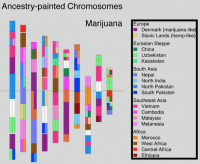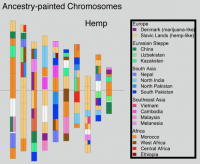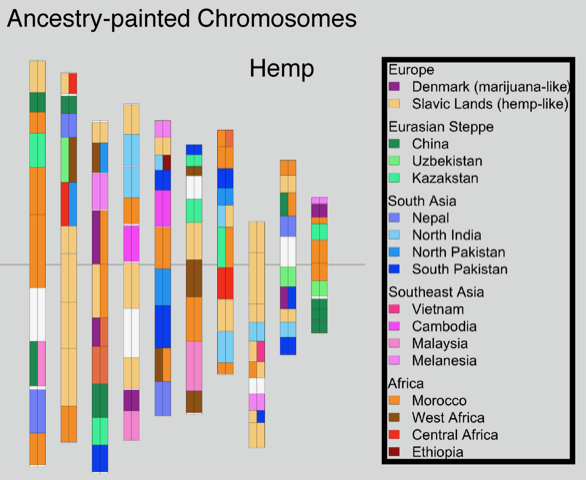Sunrise Genetics, Inc., the parent company for Hempgene and Marigene, announced last week they have successfully mapped the cannabis genome. The genome map was presented at the 26th Annual Plant and Animal Genome Conference in San Diego, CA during the panel “Cannabis Genomics: Advances and Applications.”
According to CJ Schwartz, chief executive officer of Sunrise Genetics, the full genome map will allow breeders to develop strains using DNA sequence information to complement phenotyping. “In this way a breeding program can be guided by the breeder versus blindly as it is for just pheno-hunting,” says Schwartz. “At the DNA level, we can identify what version of a set of genes a plant contains, and make predictions as to the phenotype, without ever growing the plant. As we make more and more gene markers, we have more genes to track, and breeding becomes more rapid, efficient and precise.” Schwartz says this is essential for breeding stable, repeatable plants. “A commercial strain will be grown in different environments, with solid genetics, the phenotype will mostly stay true, a term we call Genetic Penetrance.”

Determining a plant’s DNA can be extremely valuable and completing the map of the genome now makes this more precise. It can serve as a point of proof, according to Schwartz, providing evidence of lineage in a breeding project and confirming the uniqueness and identity of a strain. The genome map can also allow breeders to select specific genes to develop custom strains. And in addition to all that, it provides legal protection. “Knowing your plants DNA code is the first step to being able take action so no one else can protect it,” says Schwartz. “Well documented evidence in the development of a customized strains is essential to maintaining control of your plant and keeping those you distrust (big pharma) away, many of which have minimal interest in the whole plant anyhow.”

Schwartz says this project took them roughly 18 months to wrap up. “One of the biggest problems was just finding the right plants to grow,” says Schwartz. “In addition we used some emerging technologies and those had some challenges of their own.” According to Schwartz, a key aspect in all this was finding the right collaborators. They ended up working with CBDRx and the plant biology department at the University of Minnesota, where a DEA-licensed lab has been researching cannabis since 2002. “George Weiblen’s group at UM has been working on Cannabis for over a decade,” says Schwartz. “During that time they did repeated selfing to make highly inbred marijuana and hemp lines. The lines were instrumental in deterring the physical order of the genes.”

After finishing up some experiments, they expect to get the genome map published on public domain in less than a year, opening up their research to the general public and allowing breeders and growers to use their data. “This will be a very significant publication,” says Schwartz. “The genome assembly allows for the assimilation of all the currently incompatible Cannabis genome sequence datasets from academia and private companies,” says Schwartz. “Joining datasets from 1000s of strains, and from every continent, will generate an essential public resource for cannabis researchers and aficionados alike.” With a tool like this, we can discover the genes that help produce desirable traits. “This project is a major accomplishment for cannabis, bringing it on par with other important crops, providing a scientific tool to unravel the secrets of this incredibly versatile plant,” says Schwartz.
Sunrise Genetics is assisting cannabis businesses in evaluating strains and developing breeding programs, working with a number of customers currently to develop strains for many different specific traits. “We have the expertise to help select parental strains and guide the selection process at each generation using genotype and phenotype information,” says Schwartz. “Essentially we are bringing all the tools any modern plant breeder would use for improving strawberries to cannabis.”





